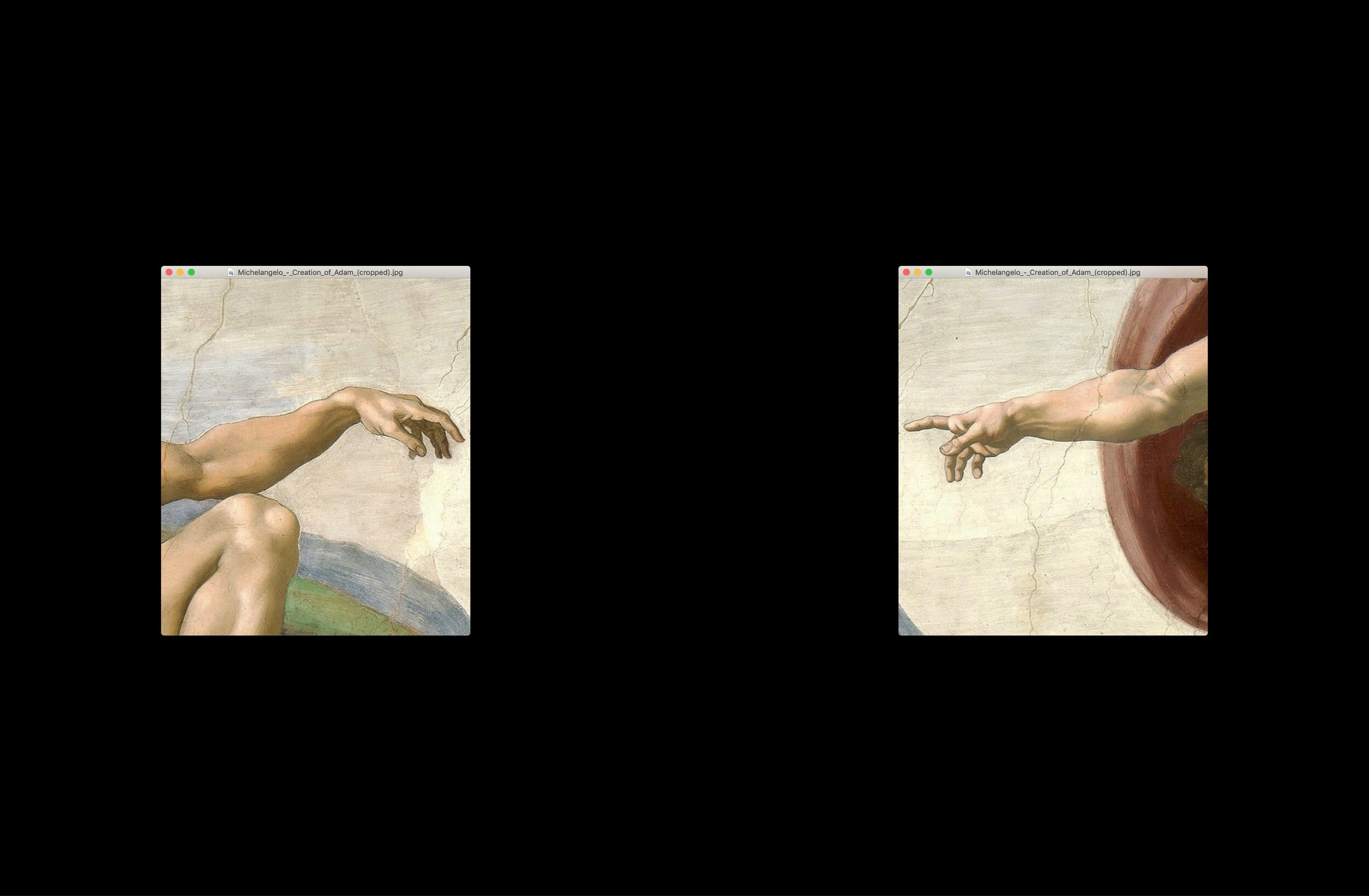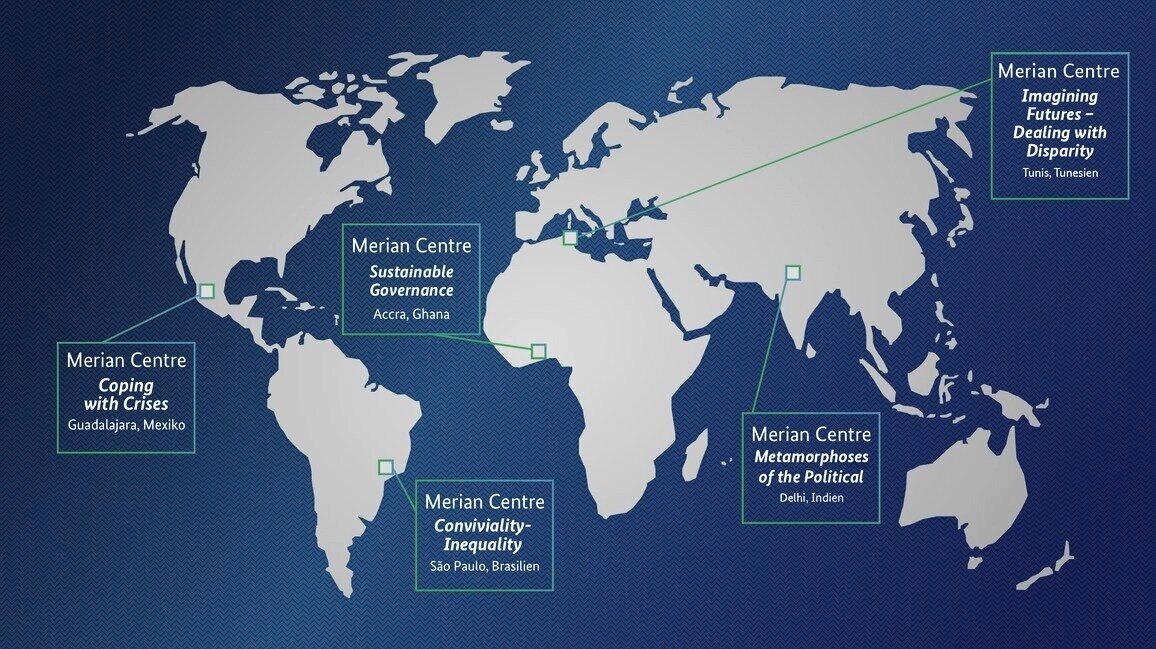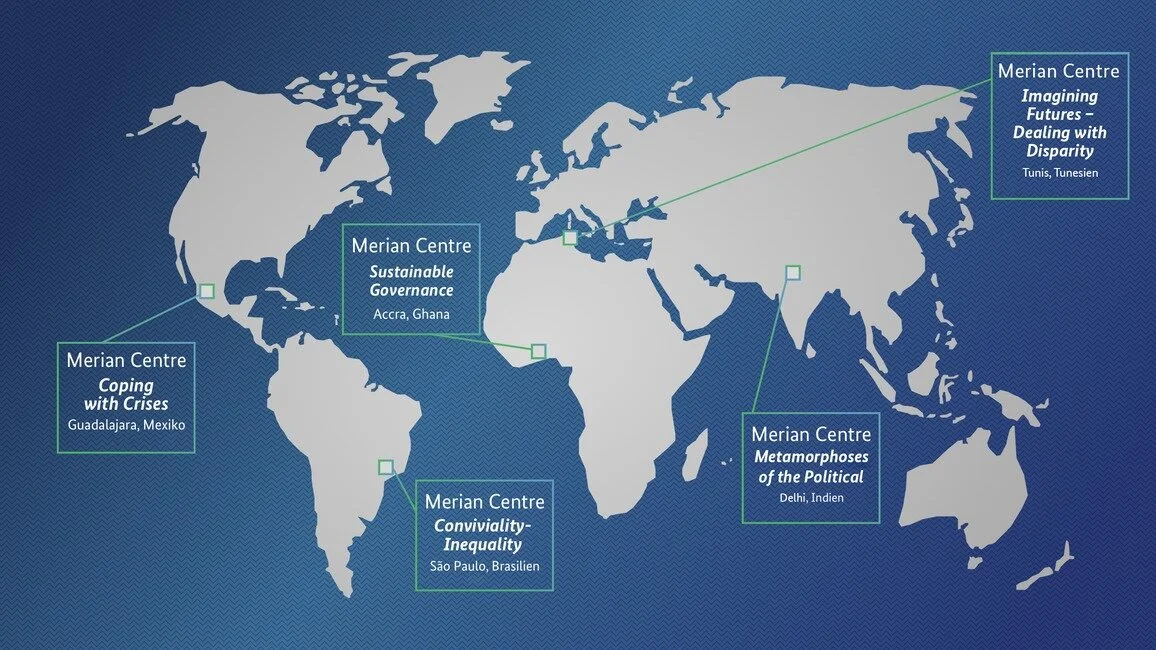
Auswirkungen der COVID-19-Pandemie auf Wissenschaft und Forschung in Partnerregionen der Merian-Zentren
GLOBE|Panel
Am 15.07. 17:00 - 19:00 Uhr (MEZ)
In Kooperation mit den Maria Sibylla Merian Zentren ICAS:MP (Delhi/Indien); CALAS (Guadalajara/Mexiko); Mecila (Sao Paulo/Brasilien); MIASA (Accra/Ghana); MECAM (Tunis/Tunesien)
Impacts of the Covid-19 Pandemic on Science and Research in Partner Regions of the Merian Centres
GLOBE|Panel
July 15, 5:00 – 7:00 pm (CET)
In cooperation with the Merian Centers ICAS:MP (Delhi/Indien); CALAS (Guadalajara/Mexiko); Mecila (Sao Paulo/Brasilien); MIASA (Accra/Ghana); MECAM (Tunis/Tunesien)
To watch the panel with simultaneous translations login here on Zoom / Um das Panel mit Simultanübersetzung zu hören, bitte hier auf Zoom klicken:
( Kenncode: 140995)
For the original languages of the panel, watch below or, alternatively, you can also visit our YouTube-Channel.
Im Rahmen des Wissenschaftsfestivals GLOBE21 möchten die durch das BMBF geförderten Merian- Zentren aus ihrem Blickwinkel einen Beitrag zum besseren Verständnis sowie zur allgemeinen Reflexion zur/über die immanenten, aber auch der möglichen langfristigen Implikationen der COVID-19-Krise auf Forschungsbedingungen im Globalen Süden sowie die internationale wissenschaftliche Kooperation leisten.
Was bedeuten Wissenschaft, Forschung und internationale Kooperation (Nord-Süd; Süd-Süd) in Zeiten der Krise? Und welche Einschränkungen und Chancen ergeben sich in diesen Bereichen? Was sind die Konsequenzen für die Merian-Zentren und die internationale Forschungsgemeinschaft?
Im letzten Jahr haben die fünf in verschiedenen Regionen des Globalen Südens angesiedelten geistes- und sozialwissenschaftlichen Merian- Zentren die Einschränkungen der internationalen Mobilität in Folge des Ausbruchs der Covid-19-Pandemie auf die Forschungs- und Austauschbedingungen in erheblichem Maße zu spüren bekommen. Zugleich sind die Merian- Zentren aber auch ein äußerst geeigneter Ort, um die Auswirkungen der Pandemie auf Forschung und Wissenschaft in diesen Partnerregionen zu beobachten, zu begleiten und zu erforschen.
Hinter der BMBF-Merian-Initiative steht die Idee, dass der vertiefte Austausch mit Wissenschaftlerinnen und Wissenschaftlern vor Ort in Ländern Asiens, Afrikas und Lateinamerikas, sowie die Zusammenarbeit mit ausländischen Hochschulen und außeruniversitären Forschungseinrichtungen einen wesentlichen Beitrag zur langfristigen Vernetzung der deutschen regionalwissenschaftlichen Spitzenforschung mit den jeweiligen Partnerländern und -regionen leistet.
At the science festival GLOBE21, the Merian Centers, which are funded by the BMBF, would like to contribute to a better understanding and general reflection on the immanent, but also on the possible long-term implications of the COVID-19 crisis on research conditions in the Global South and on international scientific cooperation.
What do science, research and international cooperation (North-South; South-South) mean in times of crisis? And what are the constraints and opportunities in these areas? What are the consequences for the Merian Centers and the international research community?
Over the past year, the five Merian- Centers in the humanities and social sciences, located in different regions of the Global South, have felt the constraints on international mobility resulting from the outbreak of the Covid 19 pandemic on research and exchange conditions to a significant degree. At the same time, however, the Merian Centers are an extremely suitable place to observe, accompany and research the effects of the pandemic on research and science in these partner regions.
The idea behind the BMBF's Merian Initiative is that in-depth exchange with scientists on the ground in countries in Asia, Africa and Latin America, as well as cooperation with foreign universities and non-university research institutions, will make a significant contribution to the long-term networking of top-level German regional science research with the respective partner countries and regions.

The Merian Centres

GLOBE|Panel
CALAS
Sarah Corona Berkin received a doctorate in communication from the Catholic University of Leuven, Belgium. She is currently a professor at the University of Guadalajara, and Director of the Maria Sibylla Merian Center for Advanced Latin American Studies. Her research focuses on written and visual communication, intercultural education and communication, as well as reading skills in different social groups. Sarah Corona Berkin belongs to the Mexican National System of Researchers (SNI, level III).
Jochen Kemner is Scientific Manager of the Maria Sibylla Merian Center for Advanced Latin American Studies (CALAS) in Guadalajara, Mexico. After completing a master's degree in history, economics, and Spanish and Latin American studies, he earned his doctorate in Latin American history and subsequently worked in several postdoctoral positions at Bielefeld University. His research focuses on Latin American and Caribbean history, slavery, memory and history politics, and global education.
ICAS-MP
Vidhu Verma is currently Professor, Centre for Political Studies, School of Social Sciences, Jawaharlal Nehru University, New Delhi, India, and has been an active member of ICAS:MP since its inception. She has also been Chairperson of the Centre for Political Studies (CPS), the Gender Sensitization Committee against Sexual Harassment (GSCASH) and the Centre for the Study of Discrimination and Exclusion (CSDE). Her areas of research include Comparative Political Theory, feminist political theory, state and civil society, affirmative action policies and social justice in India.She has recently edited and contributed to a volume on “Unequal Worlds” (OUP, New Delhi) and is the author of several books including “Non-discrimination and Equality in India: Contesting boundaries of Social Justice” (Routledge, London 2012), “Malaysia: State and Civil Society in Transition” (Lynne Rienner, USA 2002) and besides articles in several journals.
Laila Abu-Er-Rub has been Scientific Coordinator at the Merian-Tagore International Centre for Advanced Studies ‘Metamorphoses of the Political in the Long Twentieth Century’ (ICAS:MP) in New Delhi since November 2017. She studied Cultural Anthropology, Religious Studies (both at Heidelberg University) and Media Studies (University of Mannheim). After her M.A., she completed a PhD in Media and Visual Anthropology. During her PhD programme, she coordinated one of the Research Areas of the Cluster of Excellence ‘Asia and Europe in a Global Context’ at Heidelberg University (‘Public Spheres’, 2012-2017) and the EU-funded HERA SINGLE project ‘Creating the “New Asian Woman” – Entanglements of Urban Space, Cultural Encounters and Gendered Identities in Shanghai and Delhi’ (2013-2016).
MECILA
Gloria Chicote is a literary scholar and the current Director of the Instituto de Investigaciones en Humanidades y Ciencias Sociales (IdIHCS), a joint research institution of the Argentinian Consejo Nacional de Investigaciones Científicas y Técnicas (CONICET) and the Universidad Nacional de La Plata (UNLP). She is also a member of the scientific committee Centro de Estudios de Teoría y Crítica Literaria of the Facultad de Humanidades y Ciencias de la Educación of UNLP. Professor Chicote holds a PhD from the Facultad de Filosofía y Letras of the Universidad de Buenos Aires. Her recent work focuses on popular Hispanic literature from Spain to Latin America and takes a comprehensive perspective of literary parameters for the understanding of cultural processes.
Jörg Klenk is Scientific Manager at the Maria Sibylla Merian Centre Conviviality-Inequality in Latin America (Mecila) in São Paulo, Brazil. He holds a PhD in German Medieval Literature from the Universität Bern, and a master’s degree in Communication and Media Sciences from the same institution. He previously worked as a researcher and scientific project coordinator at the Berlin-Brandenburgische Akademie der Wissenschaften (2011-2014) and was a visiting researcher at the Universität Osnabrück (2015) and at the Humboldt-Universität zu Berlin (2016).
MIASA
Abena D. Oduro is the Director of the Merian Institute for Advanced Studies in Africa (MIASA) and Associate Professor in the Department of Economics, University of Ghana. She holds an MLitt. in Economics from the University of Glasgow, Scotland, UK. Her main areas of research are poverty and inequality analysis, gender and assets, unpaid care work, international trade policy and WTO issues.
Susann Baller is the Co-Director Germany at MIASA. She holds a PhD in African History from Humboldt-University Berlin. She is researcher in African history at the German Historical Institute Paris. Her research interests include African urban history, popular culture and the history of decolonization in West Africa.
Agnes Schneider-Musah is the Academic Coordinator at the Merian Institute for Advanced Studies in Africa (MIASA), at the University of Ghana. As part of the team based at the Institute in Accra on Legon campus, she is responsible for the operational matters at MIASA. Agnes Schneider-Musah is a trained linguist and received her doctorate from the University of Freiburg, Germany, in 2015 for her thesis on English in Ghana.
MECAM
Khaled Kchir is one of the two directors of the Merian Centres for Advanced Studies in the Magheb (MECAM). He is Professor of Medieval History at the Faculty of Humanities and Social Sciences, University of Tunis. He is the director of the Medieval Arab-Islamic World Laboratory since 2013. He works on the transmission of knowledge in the Middle Ages, and develops his research on the work of Ibn Khaldun (1332-1406). He teaches history, codicology and diplomacy. He has indexed 600 entries from Ibn Shâkir al-Kutubî's Fawât al-Wafayât for the Onomasticon Arabicum (IRHT/CNRS). His latest work focuses on the Berbers and the Persians as seen by Ibn Khaldun. During two terms, he successively served as a member of the board of the Tunis University (2014-2017), then as vice-president of the Tunis University (2017-2020).
Julius Dihstelhoff
Dr. Julius Dihstelhoff is responsible for the Merian Centre for Advanced Studies in the Maghreb (MECAM) as its academic coordinator. He is in charge of the operational work of MECAM in the areas of administrative and organizational coordination. Julius Dihstelhoff's research work addresses German foreign policy in the MENA region, political transformation processes in Tunisia, and the topics of regional (re)organization and political Islam. He holds a PhD in Political Science from Philipps-Universität Marburg/ Germany.











